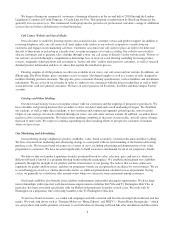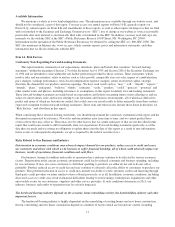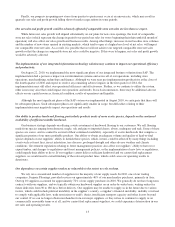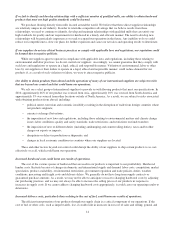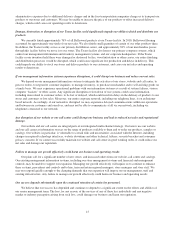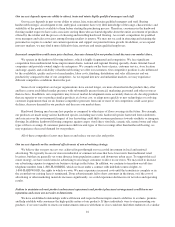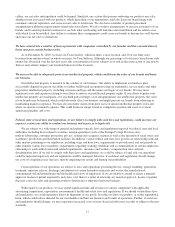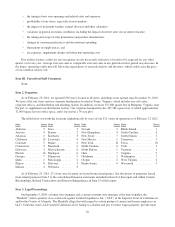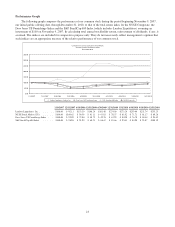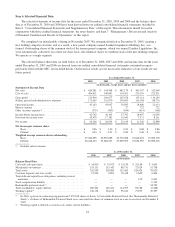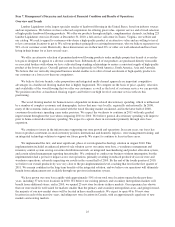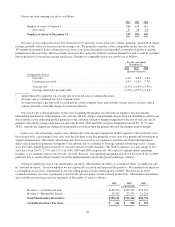Lumber Liquidators 2010 Annual Report Download - page 22
Download and view the complete annual report
Please find page 22 of the 2010 Lumber Liquidators annual report below. You can navigate through the pages in the report by either clicking on the pages listed below, or by using the keyword search tool below to find specific information within the annual report.Our success depends upon our ability to attract, train and retain highly qualified managers and staff.
Our success depends in part on our ability to attract, hire, train and retain qualified managers and staff. Buying
hardwood flooring is an infrequent event, and typical consumers have very little knowledge of the range, characteristics and
suitability of the products available to them before starting the purchasing process. Therefore, consumers in the hardwood
flooring market expect to have sales associates serving them who are knowledgeable about the entire assortment of products
offered by the retailer and the process of choosing and installing hardwood flooring. As a result, competition for qualified
store managers and sales associates among flooring retailers is intense. We may not succeed in attracting and retaining the
personnel we require to conduct our current operations and support our potential future growth. In addition, as we expand
into new markets, we may find it more difficult to hire, motivate and retain qualified employees.
Increased competition could cause price declines, decrease demand for our products and decrease our market share.
We operate in the hardwood flooring industry, which is highly fragmented and competitive. We face significant
competition from multinational home improvement chains, national and regional flooring specialty chains, Internet-based
companies and privately-owned single-site enterprises. We compete on the basis of price, customer service, store location
and range, quality and availability of hardwood flooring we offer our customers. Our competitive position is also influenced
by the availability, quality and cost of merchandise, labor costs, finishing, distribution and sales efficiencies and our
productivity compared to that of our competitors. As we expand into new and unfamiliar markets, we may experience
different competitive conditions than in the past.
Some of our competitors are larger organizations, have existed longer, are more diversified in the products they offer
and have a more established market presence with substantially greater financial, marketing, personnel and other resources
than we have. In addition, our competitors may forecast market developments more accurately than we do, develop products
that are superior to ours or produce similar products at a lower cost, or adapt more quickly to new technologies or evolving
customer requirements than we do. Intense competitive pressures from one or more of our competitors could cause price
declines, decrease demand for our products and decrease our market share.
Hardwood flooring may become less popular as compared to other types of floor coverings in the future. For example,
our products are made using various hardwood species, including rare exotic hardwood species harvested from rainforests,
and concern over the environmental impact of tree harvesting could shift consumer preference towards synthetic or inorganic
flooring. In addition, hardwood flooring competes against carpet, vinyl sheet, vinyl tile, ceramic tile, natural stone and other
types of floor coverings. If consumer preferences shift towards types of floor coverings other than hardwood flooring, we
may experience decreased demand for our products.
All of these competitive factors may harm us and reduce our net sales and profits.
Our success depends on the continued effectiveness of our advertising strategy.
We believe that our past success was achieved in part through our successful investment in local and national
advertising. We typically locate our stores in industrial or commercial areas that have lower rents than traditional retail
locations, but that are generally set some distance from population centers and downtown urban areas. To support this real
estate strategy, we have used extensive advertising to encourage customers to drive to our stores. We may need to increase
our advertising expense to support our business strategy in the future. In addition, we continue to transition our toll-free
telephone number from 1-800-FLOORING, which we lease under a contract with indefinite renewal rights, to
1-800-HARDWOOD, the rights to which we own. We may experience increased costs until the transition is complete or in
the event that our existing lease is terminated. If our advertisements fail to draw customers in the future, or if the cost of
advertising or other marketing materials increases significantly, we could experience declines in our net sales and operating
results.
Failure to maintain relevant product endorsement agreements and product placement arrangements could harm our
reputation and cause our net sales to deteriorate.
We have established relationships with well-known and respected home improvement celebrities to evaluate, promote
and help establish with consumers the high-quality nature of our products. If these individuals were to stop promoting our
products, if we were unable to renew our endorsement contracts with them or if we could not find other endorsers of a similar
16


